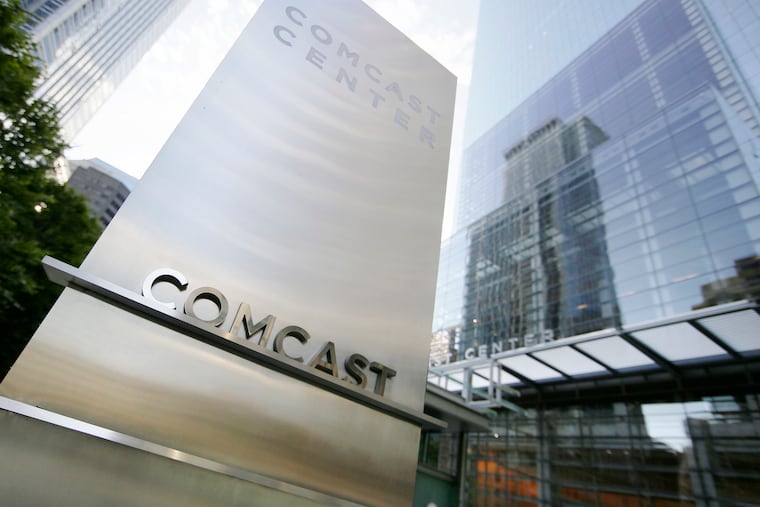Comcast falls on lost customers despite profit, revenue beat
The company lost 490,000 cable-TV customers in the quarter, an ongoing trend as consumers switch to streaming services.

Comcast Corp. slid after reporting drops in broadband and cable subscribers, and predicting more losses to come.
Cord-cutting and increasing competition have eroded Comcast’s traditional customer base. The company, which owns Xfinity, the NBCUniversal media empire, and SkyTV, lost 490,000 cable-TV customers in the third quarter, better than analysts expected but part of an ongoing trend as consumers switch to streaming services such as Netflix.
It also lost 18,000 broadband subscribers in the quarter, with nearly net losses in residential customers. Analysts had predicted Comcast would instead gain 10,900 residential broadband customers. Shares closed down 8.4% Thursday.
“Growth has halted for Comcast — the largest U.S. broadband provider, with 32 million homes,” said Bloomberg Intelligence senior media analyst Geetha Ranganathan. “The company derives 80% of profit from cable, where, even after a pandemic-demand surge, broadband has been hurt by fierce competition and low-move activity among customers.”
Comcast expects “somewhat higher subscriber losses” in the fourth quarter due to pullback on promotional offers that targeted lower-end customers, chief financial officer Jason Armstrong said on a call with investors. Revenue per customer climbed, however, in part because of price increases and promotions of higher-rate plans.
Broadband is becoming increasingly competitive as mobile providers move into the market with improved wireless internet offerings. In the past week, the Big Three — T-Mobile US Inc., AT&T Inc., and Verizon Communications Inc. — all reported subscriber gains.
Comcast offers wireless mobile through the Xfinity brand as part of a package for internet subscribers. It added 294,000 mobile phone customers, fewer than the 328,100 analyst predicted. Like broadband losses, the number may reflect stiff competition from other providers.
The company, led by chairman Brian Roberts, is seeking growth beyond its legacy cable operations. Executives are emphasizing other businesses, including the Universal theme parks and film studio, and the Peacock streaming service.
Philadelphia-based Comcast beat profit estimates in part because of subscription pricing and gains in its theme parks. It reported earnings of $1.08 a share, excluding some costs, up 13% from the prior year and above the 95 cents analysts predicted. Revenue rose to $30.1 billion, also exceeding forecasts of $29.7 billion.
Peacock added 4 million paying subscribers in the quarter for a total of 28 million, nearly doubling from the prior year thanks in part to the appearance of The Super Mario Bros. Movie on the service. Although the business lost $565 million in the quarter, that was better than analysts expected. The company also pared losses in the streaming service, expecting an annual loss of $2.8 billion, down from the $3 billion it previously predicted.
Revenue at the film studio dropped almost 24%, to $2.52 billion despite box office success for the movie Oppenheimer, which opened in July. The critically acclaimed film grossed more than $954 million in worldwide box office, making it the year’s third-highest grossing film. The year-to-year comparison suffered because last year’s third quarter included results of Jurassic World and Minions sequels.
Theme park revenue climbed 17% to $2.4 billion. Comcast operates Universal theme parks in Orlando and Los Angeles, as well as in Beijing and Osaka, Japan.